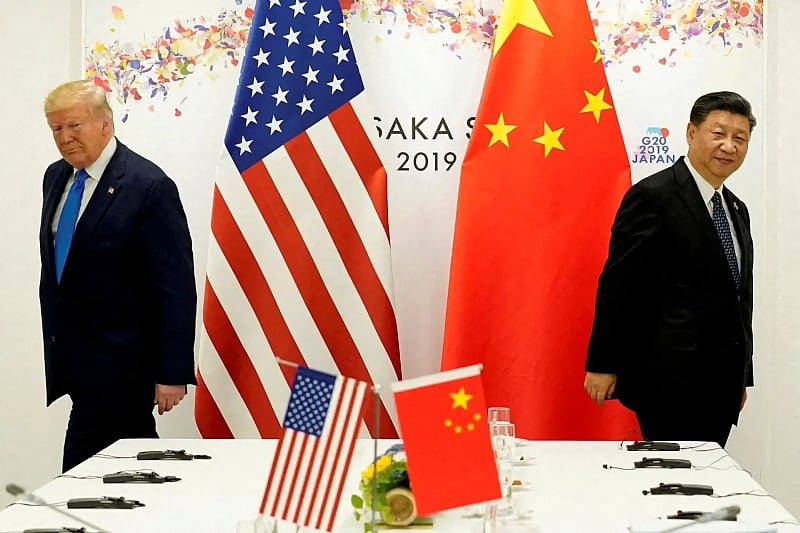The escalating trade war between the United States and China has reached a new boiling point, with both nations entrenching their positions and implementing increasingly severe tariffs. China, in its latest retaliatory move, has announced an increase in tariffs on American goods to an average of 84%, effective immediately. This aggressive response follows the US President Donald Trump’s decision to raise tariffs on Chinese imports to 104%, further intensifying the economic conflict. China’s Ministry of Commerce released a white paper outlining its stance on the trade dispute, declaring its unwavering resolve to counter any further escalation of trade restrictions by the US. The strong rhetoric employed, emphasizing China’s “firm will and abundant means,” underscores Beijing’s commitment to a protracted trade war. Significantly, the Chinese government has refrained from explicitly stating its willingness to negotiate with the US administration, diverging from the approach adopted by other countries impacted by the escalating global trade tensions.
This latest round of tariff hikes marks a significant escalation in the ongoing trade war. Previously, China had announced a 34% tariff on all goods imported from the US, coupled with export controls on rare earth minerals, a crucial component in various high-tech industries. This initial retaliatory measure was a direct response to President Trump’s imposition of what he termed “Liberation Day” tariffs. Trump’s subsequent decision to impose an additional 50% tariff on Chinese goods, effectively doubling down on his previous actions, further fueled the conflict. He concurrently declared the cessation of trade negotiations with China, a move that appears to have been met with indifference from Beijing. China’s lack of overt interest in renewed talks signals a potential hardening of its stance, suggesting a protracted and potentially damaging trade war is on the horizon.
China’s position, as articulated by Ministry of Foreign Affairs spokesman Lin Jian, emphasizes the need for the US to adopt a negotiating approach based on “equality, respect, and mutual benefit.” This statement underscores Beijing’s perception of the US’s negotiating tactics as unfair and disrespectful, highlighting the significant gap in understanding and trust between the two economic giants. The absence of any indication from China regarding its willingness to return to the negotiating table, coupled with the strong rhetoric employed in its official statements, suggests that Beijing is prepared for a prolonged standoff. The escalating trade war, characterized by tit-for-tat tariff increases and increasingly hostile rhetoric, carries significant risks for both economies and the global economy as a whole.
The imposition of these escalating tariffs has significant implications for both countries and the broader global economy. For US consumers, the increased tariffs translate to higher prices for a range of goods, from consumer electronics to everyday household items. Businesses reliant on Chinese imports face increased costs, potentially leading to job losses and reduced investment. Similarly, Chinese businesses exporting to the US face diminished market access and reduced profitability, impacting employment and economic growth. The interconnected nature of global supply chains means that the impact of this trade war is not confined to the US and China. Disruptions to trade flows and increased uncertainty can negatively impact global economic growth and investment.
The current impasse in trade negotiations underscores the deep-seated disagreements between the two countries. The US accuses China of unfair trade practices, including intellectual property theft, forced technology transfer, and market access restrictions. China, on the other hand, views the US actions as protectionist and aimed at containing its economic rise. Resolving these complex issues requires a significant shift in approach from both sides. A return to the negotiating table, based on mutual respect and a willingness to compromise, is crucial for preventing further escalation and finding a mutually acceptable resolution. Continued escalation of the trade war carries significant risks for both economies and the global economic outlook.
The escalating trade war represents a significant challenge to the global trading system and underscores the need for multilateral cooperation in addressing trade disputes. The World Trade Organization (WTO) provides a framework for resolving trade disagreements, but its effectiveness has been undermined by the current tensions. Strengthening the WTO and fostering greater adherence to its rules is essential for ensuring a stable and predictable global trading environment. Finding a resolution to the US-China trade war requires a concerted effort from both countries and the broader international community. A return to dialogue, based on mutual respect and a commitment to finding common ground, is essential for averting further economic damage and ensuring a stable and prosperous global economy.


